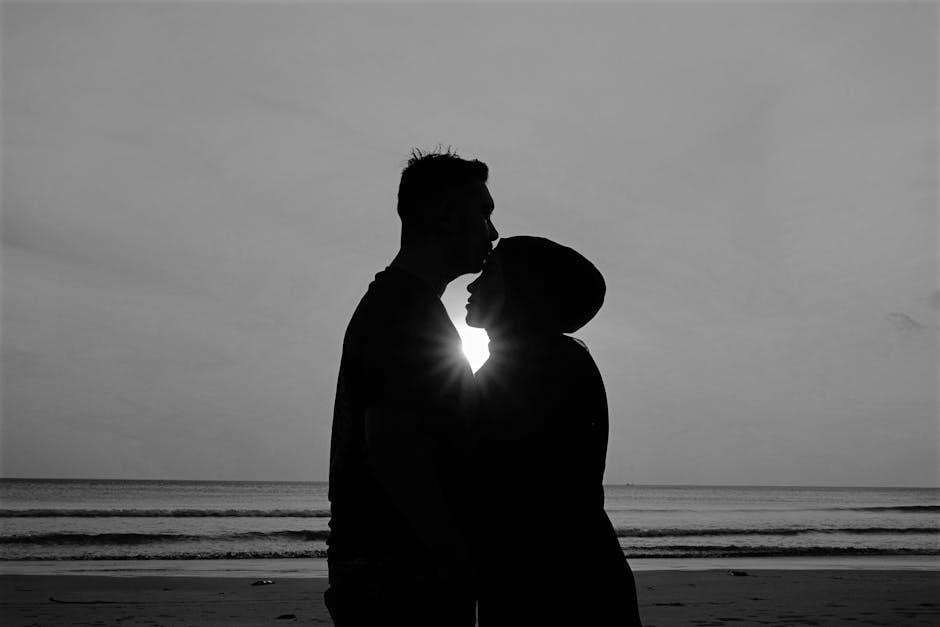Cheating With My Boyfriend’s Best Friend is a gripping novel exploring themes of betrayal, revenge, and personal transformation. It follows Olive, a young woman navigating the aftermath of her boyfriend’s infidelity, as she seeks retribution by forming a complex bond with his best friend, Aaron. The story delves into the emotional turmoil of relationships, the consequences of deceit, and the blurred lines between love and revenge, offering a dark, yet captivating, romance.
1.1 Overview of the Novel
Cheating With My Boyfriend’s Best Friend is a compelling narrative that revolves around Olive, a young woman betrayed by her boyfriend, Vincent, who cheats on her with his college classmate, Emily. Seeking revenge, Olive turns to Vincent’s best friend, Aaron, a charming and mysterious figure, igniting a forbidden romance. The novel explores themes of betrayal, love, and personal growth, delving into the emotional turmoil and moral dilemmas faced by the characters. As Olive navigates her desire for retribution and her growing feelings for Aaron, the story unfolds into a dark, intricate web of relationships, questioning the boundaries of trust, loyalty, and forgiveness. The novel captivates readers with its intense drama and thought-provoking twists.
1.2 Relevance in Modern Society
Cheating With My Boyfriend’s Best Friend resonates deeply with contemporary themes of relationships, trust, and societal expectations. The novel addresses the pervasive issue of infidelity, a common challenge in modern relationships, and its emotional aftermath. It highlights the psychological effects of betrayal, such as hurt, anger, and the desire for revenge, which are universal human experiences. By exploring the complexities of love, friendship, and retribution, the story offers a relatable lens through which readers can reflect on their own relationships. The narrative’s focus on personal growth and the quest for truth aligns with modern societal values of self-awareness and accountability, making it a thought-provoking read for today’s audience.

Story Overview
Olive discovers her boyfriend Vincent’s infidelity through a photograph, leading her to seek revenge by dating his best friend, Aaron, unraveling a web of emotional conflict.
2.1 Plot Summary
The novel begins with Olive discovering her boyfriend Vincent’s infidelity through a photograph, revealing his affair with a college classmate named Emily. Devastated, Olive confides in her best friend, who encourages her to take drastic action. Seeking revenge, Olive decides to sleep with Vincent’s best friend, Aaron, who is not only charming but also more handsome than Vincent. This act of retaliation sparks a series of emotional and relational complexities; As Olive navigates her feelings for Aaron, she begins to question her motives and the true nature of her relationships. The story unfolds with twists and turns, exploring themes of betrayal, revenge, and personal growth, while keeping readers engaged with its dramatic and often unpredictable developments.
2.2 Key Events and Conflicts
The novel’s central conflict arises when Olive discovers her boyfriend Vincent’s infidelity with his college classmate, Emily, during a reunion. This betrayal triggers Olive’s decision to retaliate by sleeping with Vincent’s best friend, Aaron, who is charming and more attractive than Vincent. The act of revenge escalates tensions, leading to a series of emotional and relational conflicts. Olive’s relationship with Vincent deteriorates further, while her connection with Aaron becomes increasingly complicated. The fallout from these events creates a web of deceit and emotional turmoil, impacting all parties involved. The story explores the consequences of betrayal and the blurred lines between revenge and self-discovery, keeping readers engaged with its dramatic and often unpredictable developments.

Author Background
Jane E.L. is a prominent author known for her work in contemporary romance and drama. Her writing style blends emotional depth with relatable characters, captivating readers worldwide.
3.1 Jane E.L.: The Author’s Profile
Jane E.L. is a contemporary author celebrated for her compelling narratives in romance and drama. Her works often explore themes of love, betrayal, and personal growth, resonating deeply with readers. Known for her vivid character development and intricate plotlines, Jane has established herself as a prominent voice in modern literature. Her ability to weave emotional depth into relatable scenarios has earned her a dedicated following. With a keen eye for human dynamics, Jane’s writing continues to captivate audiences, offering both entertainment and introspection. Her novels, such as Cheating With My Boyfriend’s Best Friend, reflect her talent for storytelling and understanding of complex relationships.
3.2 Writing Style and Themes
Jane E.L.’s writing style in Cheating With My Boyfriend’s Best Friend is characterized by vivid descriptions and emotional depth, creating a relatable and immersive narrative. Her prose captures the complexities of human relationships, blending drama with elements of dark romance. Themes of betrayal, revenge, and personal growth are central to the story, as Olive navigates the aftermath of infidelity and her subsequent choices. The author’s ability to explore moral dilemmas and emotional turmoil adds layers of complexity, making the novel thought-provoking. Through her writing, Jane E.L. examines the dynamics of love, friendship, and loyalty, offering readers a compelling exploration of human nature and its many contradictions.

Main Characters
The novel centers around Olive, a young woman betrayed by her boyfriend, Vincent, who cheats on her with his classmate. Aaron, Vincent’s charming best friend, becomes Olive’s unlikely ally in her quest for revenge, adding depth to the story’s complex dynamics.
4.1 Olive: The Protagonist
Olive is the central character of the novel, portrayed as a strong yet emotionally vulnerable woman. Her journey begins with the discovery of her boyfriend Vincent’s infidelity, which shatters her trust and sense of security. Driven by pain and a desire for retribution, Olive decides to seek revenge in an unconventional way—by forming a relationship with Vincent’s best friend, Aaron. Throughout the story, Olive’s character evolves as she grapples with her emotions, questioning her actions and the true meaning of love and loyalty. Her transformation from a betrayed girlfriend to a woman taking control of her life forms the core of the narrative, making her a relatable and dynamic protagonist.
4.2 Vincent: The Boyfriend
Vincent is Olive’s boyfriend and a central figure in the novel, whose actions set the story in motion. His decision to cheat on Olive with his college classmate, Emily, during a class reunion, triggers a chain of events that reshapes the dynamics of their relationship. Vincent’s infidelity is not just a momentary lapse but a calculated attempt to hide the truth, which further complicates Olive’s emotional state. His character represents the flawed nature of trust and loyalty, making him a pivotal yet controversial figure in the narrative. Vincent’s actions not only betray Olive but also strain his friendship with Aaron, creating a ripple effect that underscores the consequences of his choices.
4.3 Aaron: The Best Friend
Aaron, Vincent’s best friend, emerges as a charismatic and intriguing character in the novel. His role evolves from being a confidant to a key player in Olive’s quest for revenge. Aaron’s charm and allure make him a tempting option for Olive as she seeks retribution against Vincent. Despite his seemingly perfect facade, Aaron harbors his own complexities, making him a multifaceted personality. His involvement with Olive blurs the lines between friendship and romance, creating a tangled web of emotions and loyalty. Aaron’s character challenges the traditional notions of trust and friendship, adding depth to the story’s exploration of relationships and betrayal.

Themes Explored
Betrayal and revenge are central, as Olive confronts her boyfriend’s infidelity and seeks retribution. The novel also examines love and friendship dynamics and personal growth through Olive’s journey.
5.1 Betrayal and Revenge
Betrayal and revenge form the emotional core of the novel, as Olive discovers her boyfriend Vincent’s infidelity. His deceit triggers a profound sense of betrayal, pushing Olive to seek retribution. In a bold move, she turns to Vincent’s best friend, Aaron, who is both charming and alluring. This decision not only serves as an act of revenge but also explores the complexities of human emotions. The narrative delves into how betrayal can lead individuals to make rash decisions, often blurring the lines between right and wrong. Through Olive’s journey, the novel examines the psychological and emotional consequences of seeking revenge, revealing a tangled web of guilt, anger, and unexpected connections.
5.2 Love and Friendship Dynamics
The novel intricately explores the dynamics of love and friendship, particularly through Olive’s evolving relationships with Vincent and Aaron. Olive’s bond with Vincent is tested when his infidelity surfaces, while her connection with Aaron deepens, leading to romantic feelings. This tangled web of emotions highlights the fragility of trust and the complexity of human connections. The story examines how love can shift from loyalty to betrayal and how friendships can evolve into something more intimate. Through these interactions, the novel portrays the emotional struggles of navigating love and friendship, revealing the tension between loyalty and desire. The dynamics between the characters underscore the challenges of maintaining relationships in the face of betrayal and attraction.
5.3 Personal Growth and Discovery
Olive’s journey in the novel is as much about personal growth as it is about the turmoil of betrayal. Her decision to retaliate by dating Aaron forces her to confront her own emotions, leading to a profound self-discovery. Through her experiences, she learns to redefine her sense of self-worth and independence. The novel highlights how betrayal can serve as a catalyst for growth, pushing individuals to reevaluate their values and relationships. Olive’s transformation from a heartbroken girlfriend to a resilient individual underscores the importance of self-reflection and the power of taking control of one’s life. Her story serves as a reminder that even in the darkest moments, personal growth and redemption are possible.

Real-Life Implications
The novel highlights the emotional impact of infidelity on relationships, trust, and personal well-being. Olive’s actions illustrate how betrayal can escalate into a cycle of revenge, further fracturing emotional bonds and complicating relationships.

6.1 Emotional Impact on Relationships
The novel vividly portrays the emotional turmoil that arises when trust is shattered. Olive’s discovery of Vincent’s infidelity leads to a cascade of feelings, from anger and betrayal to a deep sense of hurt. Her decision to seek revenge by engaging with Aaron further complicates the emotional landscape, creating a web of guilt, resentment, and confusion. The story highlights how cheating can erode the foundation of relationships, leaving all parties involved emotionally scarred. The emotional impact extends beyond the immediate individuals, affecting friendships and fostering an environment of distrust. This narrative serves as a stark reminder of the long-lasting consequences of betrayal and the challenges of rebuilding trust in fractured relationships.
6.2 Psychological Effects of Infidelity
The psychological toll of infidelity is a central theme in the novel, as Olive grapples with the emotional aftermath of Vincent’s betrayal. Her decision to retaliate by engaging with Aaron introduces a complex mix of guilt, shame, and inner conflict. The act of cheating, whether as revenge or a lapse in judgment, leaves lasting scars on all parties involved. Vincent, aware of his wrongdoing, struggles with guilt and paranoia, while Aaron’s charm and charisma mask his own internal turmoil. The novel explores how infidelity can lead to anxiety, depression, and a loss of self-worth, highlighting the profound psychological impact on relationships and individual well-being. The characters’ journeys illustrate the long-term consequences of such actions, emphasizing the fragility of trust and the difficulty of redemption.
6.3 Societal Views on Cheating
Societal views on cheating are often judgmental and condemning, reflecting a widespread moral stance against infidelity. The novel highlights how cheating is perceived as a breach of trust, leading to public judgment and strained relationships. In real-life stories, individuals who cheat are frequently ostracized, with blame often placed on the person who initiated the infidelity. However, societal norms vary, with some communities being more forgiving and others outright condemning such actions. The novel mirrors these societal attitudes, as Olive’s decision to retaliate by cheating with Aaron sparks both personal and external criticism. This duality underscores the complexity of societal expectations and the moral ambiguity surrounding infidelity, making it a relatable and thought-provoking theme for readers.

Moral and Ethical Considerations
Cheating With My Boyfriend’s Best Friend raises questions about the morality of revenge and the ethical implications of using someone to heal personal wounds. Olive’s actions challenge traditional notions of right and wrong, highlighting the gray areas in relationships and the consequences of prioritizing retribution over resolution.
7.1 The Morality of Revenge
Revenge, as depicted in Cheating With My Boyfriend’s Best Friend, sparks a moral debate about its justification. Olive’s decision to sleep with Aaron, her boyfriend’s best friend, is portrayed as a form of retaliation for Vincent’s infidelity. While revenge may provide temporary emotional relief, it often perpetuates a cycle of harm and guilt. The novel questions whether seeking revenge is morally justifiable or if it merely exacerbates personal and relational damage. This theme encourages readers to reflect on the ethical implications of using others as a means of healing or retaliation, highlighting the complexity of human emotions and actions in the face of betrayal.
7.2 Consequences of Actions
In Cheating With My Boyfriend’s Best Friend, the characters’ decisions lead to far-reaching consequences. Olive’s choice to retaliate by sleeping with Aaron creates a ripple effect, damaging relationships and trust. Vincent’s infidelity not only hurts Olive but also strains his friendship with Aaron, revealing the fragility of bonds. The novel illustrates how impulsive actions, driven by pain or anger, can result in emotional fallout, broken relationships, and regret. These consequences highlight the difficulty of undoing harm once it is done, emphasizing the importance of considering the long-term effects of one’s choices. The story serves as a cautionary tale about the interconnected nature of actions and their impact on everyone involved.
7.3 Forgiveness and Moving Forward
Forgiveness and moving forward are central themes in Cheating With My Boyfriend’s Best Friend, as the characters grapple with the aftermath of betrayal. Olive’s journey highlights the difficulty of forgiving both herself and others, as trust is shattered and relationships are irreparably damaged. The novel explores the emotional turmoil of seeking forgiveness and the challenges of rebuilding trust in the wake of infidelity. It also raises questions about whether true forgiveness is possible or if some wounds run too deep. The story ultimately leaves readers contemplating the complexities of moving forward, emphasizing that forgiveness is a process, not a destination, and that healing requires accountability and self-reflection. The novel’s portrayal of forgiveness is raw and realistic, resonating with readers who have experienced similar struggles.

Coping Mechanisms
Seeking support from friends, self-reflection, and personal growth are key mechanisms Olive and others use to navigate emotional challenges, fostering resilience and rebuilding trust in relationships.
8.1 Dealing with Betrayal
Dealing with betrayal is a central theme in the novel, as Olive grapples with her boyfriend’s infidelity and the emotional fallout. The discovery of Vincent’s cheating sends Olive into a spiral of anger and heartbreak, prompting her to seek revenge. Her decision to sleep with Aaron, Vincent’s best friend, is a complex reaction to the betrayal, driven by both hurt and a desire for retribution. This act of revenge, however, leads to further emotional turmoil, highlighting the destructive nature of betrayal and the challenges of navigating such situations. The novel explores how betrayal can reshape relationships and force individuals to confront their own vulnerabilities and desires.
8.2 Seeking Support Systems
Seeking support systems plays a crucial role in navigating the aftermath of betrayal, as highlighted in the novel. Olive, after discovering Vincent’s infidelity, turns to her best friend for advice and emotional support. This interaction not only helps her process her feelings but also leads to the revelation of evidence that confirms Vincent’s cheating. The novel underscores the importance of having a support network, whether through friends, family, or online communities, to cope with the emotional turmoil. Real-life stories shared online further emphasize how support systems can provide solace and guidance during such challenging times. By reaching out, individuals can gain the strength needed to make difficult decisions and move forward. This reinforces the value of seeking help in times of crisis.
8.3 Rebuilding Trust
Rebuilding trust after betrayal is a challenging yet crucial process, as depicted in the novel and real-life accounts. For Olive, trust is shattered when Vincent cheats, and her relationship with Aaron complicates matters further. The novel highlights how trust can only be restored through open communication and accountability. Both parties must confront their actions and their consequences. However, the journey is often fraught with doubt and uncertainty, as seen in Olive’s internal conflict. Real-life stories shared online echo this struggle, emphasizing the importance of mutual effort and genuine remorse. Without these elements, rebuilding trust becomes nearly impossible, leaving relationships fractured. The novel and online narratives illustrate that trust, once broken, requires time, honesty, and commitment to be partially restored, though it may never fully return to its original state.

Lessons Learned
The novel underscores the importance of communication and self-reflection in navigating relationship dynamics. It highlights how betrayal can lead to personal growth and a deeper understanding of one’s values and boundaries, ultimately fostering resilience and emotional maturity.
9.1 Importance of Communication
Effective communication is a cornerstone of healthy relationships, as evident in the novel. Olive’s journey highlights how misunderstandings and unaddressed emotions can escalate conflicts. Open dialogue could have prevented Vincent’s betrayal and Olive’s subsequent revenge; By fostering honest conversations, individuals can address concerns before they fester, building trust and understanding. The story emphasizes that bottling emotions or avoiding difficult discussions often leads to destructive actions. Communication not only resolves conflicts but also strengthens bonds, allowing partners to navigate challenges together rather than turning to deceit or revenge. This lesson underscores the necessity of transparency and emotional expression in maintaining meaningful connections and preventing relationship breakdowns.
9.2 Understanding Relationship Dynamics
The novel sheds light on the intricate dynamics within relationships, particularly focusing on trust, loyalty, and the ripple effects of betrayal. Olive’s journey reveals how miscommunication and unmet emotional needs can lead to infidelity, while Aaron’s charm and Vincent’s deceit further complicate the web of connections. The story illustrates how power struggles and emotional vulnerabilities shape interactions, often resulting in destructive patterns. By exploring these dynamics, the book highlights the importance of understanding each partner’s needs and boundaries. It also shows how external influences, like Aaron’s allure, can disrupt even seemingly stable relationships. Ultimately, the novel serves as a cautionary tale about the fragility of trust and the consequences of neglecting emotional intimacy in partnerships.
9.3 Self-Reflection and Growth
Olive’s journey in Cheating With My Boyfriend’s Best Friend underscores the importance of self-reflection and personal growth in overcoming betrayal. Initially driven by anger and a desire for revenge, Olive gradually confronts her own flaws and the underlying issues in her relationship with Vincent. Her affair with Aaron forces her to examine her choices and the emotional voids that led to such decisions. Through this tumultuous process, Olive learns to take responsibility for her actions and gains clarity about what she truly desires in life and love. The novel emphasizes how crises can serve as catalysts for self-discovery, enabling individuals to emerge stronger and wiser. Olive’s evolution highlights the transformative power of facing one’s mistakes and embracing change.
Cheating With My Boyfriend’s Best Friend masterfully explores betrayal, revenge, and redemption, leaving readers with a profound reflection on love, trust, and personal growth.
10.1 Final Thoughts
Cheating With My Boyfriend’s Best Friend delivers a compelling narrative that challenges readers to reflect on the consequences of betrayal and revenge; Olive’s journey from heartbreak to empowerment highlights the complexity of human emotions and the lengths people go to for closure. The novel underscores the importance of communication, trust, and self-reflection in relationships. While revenge may seem like a quick fix, it often leads to deeper emotional wounds and unresolved issues. This story serves as a reminder that true growth comes from confronting pain rather than escaping it. For fans of dark romance and psychological drama, this novel is a thought-provoking exploration of love, betrayal, and redemption.
10.2 The Novel’s Impact
Cheating With My Boyfriend’s Best Friend has left a lasting impact on readers by sparking important conversations about betrayal, revenge, and personal growth. Its relatable themes and intense plot have resonated with many, making it a popular topic of discussion in literary circles. The novel challenges societal norms by exploring the complexities of infidelity and the consequences of seeking revenge. It also highlights the importance of self-reflection and understanding in navigating relationship dynamics. For many readers, the story serves as a mirror, prompting them to evaluate their own relationships and moral compass. By blending drama with emotional depth, the novel has become a significant work in contemporary romance literature, leaving a lasting impression on its audience.
